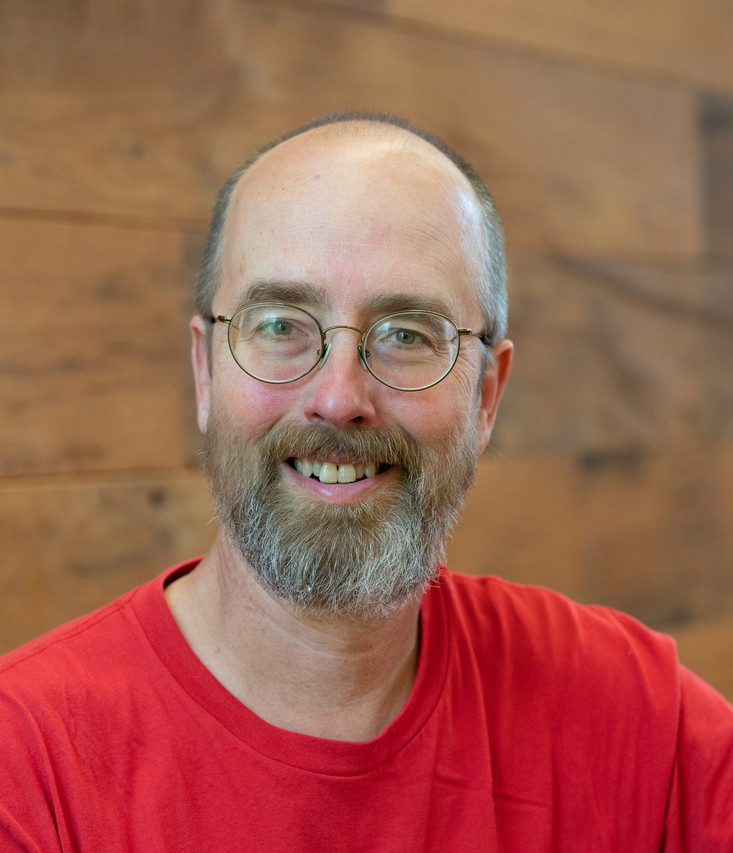
AFSC Michigan staff (from left) Adalia Kirby, Claudia McLean, Lawanda Hollister, Natalie Holbrook-Combs and Skylar Gillette stand with cutouts of friends and family inside prison.
Everyone deserves a second chance. For many in prison, that opportunity never comes. Instead, the U.S. criminal legal system overly relies on life or long sentences.
AFSC’s Michigan Criminal Justice Program is working to change that. Rooted in our Quaker belief in the Light in all people, our work recognizes everyone’s capacity to change.
One example of our efforts is our Commutation Project. It pairs women serving life and long-term sentences with community volunteers on the outside. Through visits, phone calls, and letters, they learn from each other and work toward applying for commutation and release.
Together, they draft an application for a commutation of sentence. That goes to the parole board for initial review, where it could be moved forward to a public hearing, and, ultimately, on the governor’s desk for a final decision.
About 1,800 people are incarcerated at the Women’s Huron Valley (WHV) Correctional Facility in Ypsilanti, Michigan. It is the only women’s correctional facility in the state of Michigan. Over 500 of these women are serving life or long-term indeterminate sentences (i.e. at least a 15-year sentence). Their average age for incarceration is 35—far higher than men’s. Black people of all genders are 2.5 times more likely to receive a long sentence than white people.
A lot of these women have extensive histories of trauma, says Program Coordinator Adalia Kirby. “They’ve been through a lot of abuse – sexual, physical, mental abuse, domestic violence, early pregnancies,” she says. This unaddressed trauma builds up—and sometimes leads to crime.
Volunteers help women explain the context of their crime and what factors should mitigate the reduction of their sentence. They explore why they’re requesting a commutation and what their plans are for housing and employment plans when they’re released.
The process can be very difficult, but the project has made a major difference for women in prison as well as their partners on the outside. Margaret Neal, now in her 70s, has served 40 years in prison. She hadn’t had a visitor in decades until Tracy Darrow joined the Commutation Project 18 months ago. With Tracy’s encouragement, Margaret started taking classes. Now she’s close to attaining her GED.
April Juarez has been in prison for nearly 15 years. “Getting to know [volunteer] Donna Clark has impacted my prison experience because she offers so much support and helpful insight,” she says. “Donna shows me a lot of love and understanding. She’s a real friend.”

April Juarez, left, and Donna Clark.
For her part, Donna says she’s learned about the resilience that the women develop through community, even in a dehumanizing environment like prison. “I have always been impressed by April’s openness,” Donna says. “I feel privileged to share in her difficult times and am uplifted and inspired by her insight and her bright and determined spirit.”
Mary Lemons has also gotten a lot from partnering in the project with volunteer Mary Lynn Stevens. “When you’re incarcerated for long periods of time and your family passes away, it can be difficult to continue seeing the outside world as accepting of you,” she says. “Mary Lynn and others who give of themselves to this work see us as more than our mistakes and bad choices. It gives me renewed faith in the outside world that I want to be a part of.”
Mary Lynn sees Mary as a genuine friend. “My prediction is that [after being granted a commutation] Mary will go to work, pay taxes, and be a wonderful neighbor and community volunteer,” she says. “People will wonder, ‘Why wasn't this terrific person here sooner?’”
Linda Nunn has had her commutation proposal make it all the way to a public hearing. She credits getting to know her commutation partner, AFSC’s Skylar Gillette, as one of the reasons for it.
“The hours they put into knowing me as a person, not just a prisoner, made me feel like a human being again,” Linda says of Skylar. “They went from being a partner to a good friend for life.”
Skylar says that getting to know Linda has helped them grow into a more empathetic citizen, advocate, and friend.
“From deep conversations related to her past to light-hearted phone calls about family traditions, Linda’s authenticity always shines through,” Skylar says. “It highlights the complexities and interconnectedness of grief and joy, desperation and comfort, kindness and anger, and always honesty. Her wisdom is always welcomed, and she welcomes mine.”

Community volunteers gather in the AFSC Michigan office for a visioning event in concert with women inside.
Relationships and community building are an essential part of the project. “It’s really beautiful work we’re doing,” Adalia says. “No matter what happens with the commutation process, no one can take away the trust that people establish.”
The project is personal for Adalia, too. These women are “my friends, my sisters and my aunts, my grandmothers,” she says. “A lot of these women I tell, ‘It doesn’t matter where I go or what I do or what happens. I’m not going to forget about you or give up on you. We’re going to keep doing this until you come home.”
Interested in learning more about AFSC’s Commutation Project? Volunteers from any location are welcome to join. AFSC hosts informational workshops every third Thursday of the month. Register on Zoom.
Adalia encourages people to learn more about AFSC’s work to center the clemency process on community.
